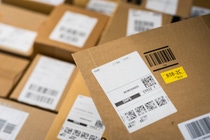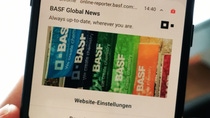Dispersions & Resins
BASF has developed new adhesives for labels that no longer interfere with paper and paperboard recycling
- Acronal RCF 3705 and Acronal RCF 3706 combine good adhesive properties with easy removal from the recovered paper stream during recycling of paperboard packaging
- Positive effect on recyclability certified by “Papiertechnische Stiftung” (PTS foundation)
- BASF contributes to a circular economy in the global label and packaging industry
BASF has achieved a breakthrough in the development of adhesives that do not interfere with the recycling of transport boxes, such as paperboard and cardboard boxes with paper labels coated with Acronal RCF 3705 or Acronal RCF 3706. Both adhesives have been certified by “Papiertechnische Stiftung” (PTS) for this property. PTS is a German research and service institute that supports companies in all sectors in the development and application of modern fiber-based solutions. The institute carries out materials testing for paper and cardboard packaging. “As we work to achieve worldwide climate neutrality, greater circularity and more effective recycling are a must. By developing the recycling friendly adhesives Acronal RCF 3705 and Acronal RCF 3706, BASF has made a decisive contribution towards more sustainable labeling, for example in the logistics sector,” said Uwe Düsterwald, Project Manager, Sustainability in Adhesives, BASF.
In addition to the automotive and food industries, logistics is another sector with a high demand for pressure-sensitive labels. For several years until today, transport labels have comprised the fastest growing share of the market. This is confirmed by Alexander Watson Associates (AWA) Market Reports such as “European Labeling and Product Decoration 2017” and the “Global Annual Review Labeling and Product Decoration 2020”. This trend has been reinforced by the pandemic in 2020 and 2021 with rapid growth in e-commerce and mail order sales, which currently accounts for almost 15% of the demand for labels in Europe.
These innovative adhesives solve a fundamental problem for paper and cardboard packaging recycling. While most of the adhesives used for paper labels interfere with the paper recycling process, the newly developed adhesives are easy to remove early in the process, making it possible to reuse and print recycled paper or paperboard packaging without any further issues.
This solution reaffirms BASF’s commitment to achieving a sustainable circular economy as set forth in the European Union’s Green Deal. By passing the Green Deal, the EU sets the objective of achieving climate neutrality in industry and society by 2050. To help reach this target, BASF became a founding member of the cross-industry coalition CELAB (Toward a Circular Economy for Labels) in 2020. The global network is working on solutions to reduce the environmental impact of the labeling industry and to promote a circular economy for self-adhesive labels in all industries. As Thomas Schiele, Vice President Adhesives, Fiber Bonding and Paper Coating Chemicals at BASF, pointed out, “The constantly growing demand for packaging has made its recyclability a key issue for the packaging industry. Steps need to be taken, not only with respect to the packaging materials, but also the adhesives that are being used. Our innovative adhesive technologies open up completely new possibilities for a working circular economy, both in the packaging industry as well as in many other sectors.”
For additional information about BASF, visit www.basf.com/adhesives.
BASF’s Dispersions & Resins division
The Dispersions & Resins division of BASF develops, produces and markets a range of high-quality polymer dispersions, resins, additives and electronic materials worldwide. These raw materials are used in formulations for a number of industries, including coatings, construction, adhesives, printing and packaging, electronics and paper. With its comprehensive product portfolio and its extensive knowledge of the industry, the Dispersions & Resins division offers its customers innovative and sustainable solutions and helps them advance their formulations. For further information about the Dispersions & Resins division, please visit www.dispersions-resins.basf.com.
About BASF
At BASF, we create chemistry for a sustainable future. We combine economic success with environmental protection and social responsibility. More than 110,000 employees in the BASF Group contribute to the success of our customers in nearly all sectors and almost every country in the world. Our portfolio is organized into six segments: Chemicals, Materials, Industrial Solutions, Surface Technologies, Nutrition & Care and Agricultural Solutions. BASF generated sales of €59 billion in 2020. BASF shares are traded on the stock exchange in Frankfurt (BAS) and as American Depositary Receipts (BASFY) in the U.S. Further information at www.basf.com.
P-22-131


